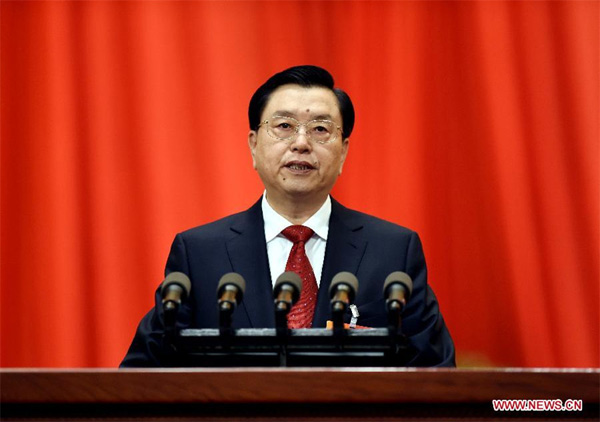

 |
| Zhang Dejiang, chairman of the Standing Committee of China's National People's Congress (NPC), delivers a work report of the NPC Standing Committee during the second plenary meeting of the third session of the 12th NPC at the Great Hall of the People in Beijing, capital of China, March 8, 2015. [Photo/Xinhua] |
China mulls anti-graft law to institutionalize crackdown
Top legislator Zhang Dejiang on Sunday stressed the importance of a legal basis in supporting the country's economic and political reform as he announced a series of plans for legislation.
Zhang, Chairman of the Standing Committee of the National People's Congress (NPC), said China plans to enact legislation to tackle corruption while delivering the work report of the NPC Standing Committee during the full congress meeting, where 3,000 deputies attended.
In an effort to align the ongoing anti-graft crackdown with the decision on the rule of law adopted by the Communist Party of China Central Committee last October, the top legislature is mulling imposing harsher punishments on those committing the crimes of embezzlement and bribery, reported the Xinhua News Agency.
The anti-graft legislation should be introduced as quickly as possible and the system of sanctions and prevention improved with the goal being a mechanism which means "officials dare not, cannot and do not want to be corrupt," according to the decision.
Other legislation includes a revision of the Administrative Supervision Law to boost governance, as well as revising business-related legislation including the Securities Law and the Advertisements Law.
"We should insist that legislation should always come first … to ensure the compatibility between law and reform decisions, so that there will be a legal basis in supporting the major reform," said Zhang.
Observers said Zhang's report reflects the Chinese government's efforts to institutionalize the country's reform and to address the long-standing conflicts between the innovation of reform policies and the limitations brought by the existing regulations.
"The law should keep up with the pace of reform, and the legislation efforts should focus on the areas that require immediate attention so as to ensure the reform policies are in line with the law," Song Shiming, a professor of public administration with the Chinese Academy of Governance, told the Global Times.
His points were echoed by Zhi Zhenfeng, an associate research fellow at the Institute of Law, Chinese Academy of Social Sciences, who believes Zhang's initiatives will solve the conflict between reform and legislation.
"During the early years of reform and opening up, the legal system was not comprehensive and updated enough to support the reform policies. There have been some cases of bypassing the regulations so as to advance the reform policies," Zhi told the Global Times.
China over the last 30 years has made significant progress in improving the legislation and advancing the rule of law.
Up till the end of last year, the NPC had introduced a total 243 laws that are currently in practice. The basic framework of China's legal system was formed in 2010, centering around the Constitution and constituted of national law, administrative regulations and local laws, said Zhang Wenxian, the vice president of the China Law Society.
With a significant rise in legal awareness among government officials and the public in recent years, the government has become active in closing the gap, Zhi noted.
The Pilot Free Trade Zone in Shanghai, established in 2013 as the testing ground for a number of economic reforms, has eased a few investment rules to address the conflicts between the preferential policies implemented in the zone with the current laws of foreign companies.
Speeding up related legislation will prevent such cases from reoccurring, and will provide the support needed in advancing with the innovation, Zhi said.
As the government continues the ongoing anti-graft crackdown in what Chinese President Xi Jinping described as "putting power within a cage of regulations," Zhi believes there is also a need to institutionalize the drive.
There should be better coordination between Party organs and State prosecutors, the two bodies that are mainly in charge of the investigation of corruption cases, said Zhi, who believes that the legislation could better define the roles of the two bodies.
China will also improve legislation on democracy, which includes revisions in the Electoral Law for the NPC and Local People's Congresses, the Organic Law and the Law on Administrative Review.
 China hosts overseas disaster relief exercise for the first time
China hosts overseas disaster relief exercise for the first time 20 pairs of twins who will become flight attendants in Sichuan
20 pairs of twins who will become flight attendants in Sichuan J-11 fighters in air exercise
J-11 fighters in air exercise PLA soldiers operating vehicle-mounted guns in drill
PLA soldiers operating vehicle-mounted guns in drill Beauties dancing on the rings
Beauties dancing on the rings Blind carpenter in E China's Jiangxi
Blind carpenter in E China's Jiangxi Top 10 highest-paid sports teams in the world
Top 10 highest-paid sports teams in the world In photos: China's WZ-10 armed helicopters
In photos: China's WZ-10 armed helicopters UFO spotted in several places in China
UFO spotted in several places in China Obama is sowing discontent in S.China Sea
Obama is sowing discontent in S.China Sea Rescuers work through night to reach cruise ship survivors
Rescuers work through night to reach cruise ship survivors Driving through limbo
Driving through limbo Facing down MERS
Facing down MERSDay|Week